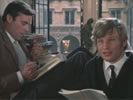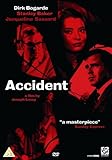Eye For Film >> Movies >> Accident (1967) Film Review
Accident
Reviewed by: Jeff Robson

Among Simon Bates’ many contributions to Western culture, he once provided the best one-line summary of Dirk Bogarde’s career I’ve ever heard.
When the venerable thesp’s name came up in the ‘Birthday File’ segment of his poptastic mid-Eighties mid-morning show, Batesy’s verdict was: “In every British film of the Fifties – and every German one of the Seventies”.

It neatly encapsulates Bogarde’s transformation from the feahfully English matinee idol of the ‘Doctor’ series and the like to the doomed, brooding arthouse darling of classic MittelEuropa glumfests such as Death In Venice and The Damned (both actually directed by an Italian, Luchino Visconti, but with very Teutonic subject matter and sensibility).
It was a remarkable journey, one that could be used to make a good case for Bogarde as this country’s finest, most versatile screen actor. But of course it didn’t happen just like that and a key interim stage was a series of bold and challenging films he made during the Sixties.
Basil Dearden’s Victim (1961) was one of the first British movies to address the issue of homosexuality when it was still a criminal offence and Bogarde’s restrained but moving performance was one of the first to hint at a greater range beyond the easy charm and comic timing of his early successes. But an even more fruitful pairing was with the blacklisted and exiled American director Joseph Losey in The Servant (1963) and Accident, showing in a restored print as the centrepiece of the BFI’s Losey retrospective.
Losey fell foul of the House Un-American Activities Committee early in his career (which began in 1948 with the still strange and striking nuclear parable The Boy With Green Hair). And though the accusations were, like most of HUAC’s, hugely overblown, he had an undoubtedly left-wing sensibility, as well as an unashamedly intellectual and artistic approach to cinema (he once said: “If movies were really just about storytelling, I’d just stand in front of the camera and tell you a story”).
He found work in Britain in the early Fifties and in fact his first British feature was the Bogarde-starring Sleeping Tiger (1954), proof that Bogarde was stretching his acting envelope even then.
But it was The Servant, nearly a decade later, which was their high point. Scripted by Harold Pinter it cast a cold and critical eye on the British class system, with Bogarde as a decadent manservant playing mind games with James Fox’s hapless aristo. His chillingly manipulative sociopath is a long way away from Doctor Simon Sparrow and one of Bogarde’s finest performances.
Accident explores very similar territory. Bogarde is Stephen, an Oxford philosophy don in his forties, with two children, a loving wife (Vivien Merchant) pregnant with their third and a beautiful house in the Oxfordshire countryside.
It’s a seemingly idyllic existence, but Stephen is bored and restless. When one of his students, William (Michael York) confides to him that he has fallen in love with another Anna (Jacqueline Sassard), a beautiful and intelligent Austrian ‘princess’, Stephen does all he can to bring them together.
In the process, he becomes increasingly infatuated with Anna, which changes his relationship with William. And matters are further complicated by the presence of Charley (Stanley Baker), a fellow academic who’s also a successful novelist and ‘telly don’- and who seems to have taken a shine to Anna too...
The film explores (in classically elliptical Pinter style) the relationships between this quartet, as a languid summer unfolds and the balance of power (not to mention the audience’s sympathies) shift this way and that, culminating in the accident of the title.
To say more would be to give too much away, though in truth not that much actually happens. This is one of those films were the drama lies in what’s not being said or done. Pinter (adapting a novel by Nicholas Mosley) was a master of this, of course, and the brittle, feigned civility as Stephen and Charley engage in their ever-so-British battle for Anna, prompts dialogue the equal of any he ever wrote.
Of course, this also means that if you find his stuff mannered and overdone, this film is definitely not for you. And even at the time, these cinematic tales of sophisticated English gentlefolk and their doomed, terribly restrained affairs were becoming the stuff of parody (Pete N’ Dud spoofed the genre gloriously in the original version of Bedazzled).
Accident lacks the intensity of The Servant, or the emotional range of The Go-Between, Losey’s third and best collaboration with Pinter. But it’s still a telling, beautifully-observed view of a beguiling but stifling world, where tutorials are accompanied by a gallon of sherry and Sunday means long lunches followed by tennis and a ‘cold supper’, with the church bells tolling in the background.
Losey had an Anglophile’s love of the English landscape and some scenes (a leisurely punt upriver, a field transformed by a sudden cloud gusting across it) are like a Constable watercolour. He’s equally obsessed with the rituals of the Oxford literati; their rituals, and those of William’s gentleman farmer set, provide some barbed but indulgent comic interludes. In fact, this film directs its sharpest satire against London media folk; a disastrous trip there by Stephen, in a failed bid to get some TV work himself, depicts a city of ghastly modern buildings filled with ghastly modern people.
But the setting can’t disguise the cruelty and power games on display and both writer and director are well-served by their cast. Bogarde could always display a world of emotion with a raised eyebrow or a subtle change in that handsome but melancholy face and this is him at the top of his game; Stephen is detached to the point of inertia, his passion for Anna revealing an undreamt-of capacity for emotional yearning – but also for cruelty and betrayal – which he struggles to keep behind his urbane mask.
Baker makes a perfect foil for him. He’d also enjoyed several previous collaborations with Losey which took him beyond the ‘British tough guy’ persona which inspired Michael Caine, among others, to believe that working-class lads could be actors too. He’s certainly a much more physical, forceful presence than Bogarde, but equally good at conveying the subtleties of character beyond seemingly mundane words and gestures, as he falls under Anna’s spell too.
York makes an impressive debut as the callow, but earnest young suitor and in fact, the only real weak point is Sassard, whose screen presence is wooden and stilted, though this adds to the aura of otherness that captivates all three of her suitors.
The supporting cast are terrific too (particularly Pinter’s then-wife Merchant, in a role leant extra irony by their subsequent history). Jerry Fisher (in his first collaboration of eight with Losey) provides luscious cinematography and there’s a gloriously languid jazz/classical/pastoral score by John Dankworth.
It may seem like a message from another world now, but Losey, Pinter and Bogarde (all sadly no longer with us) realised that love and hate are universal, very closely linked – and often most powerfully expressed by not being expressed.
Reviewed on: 20 May 2009



















